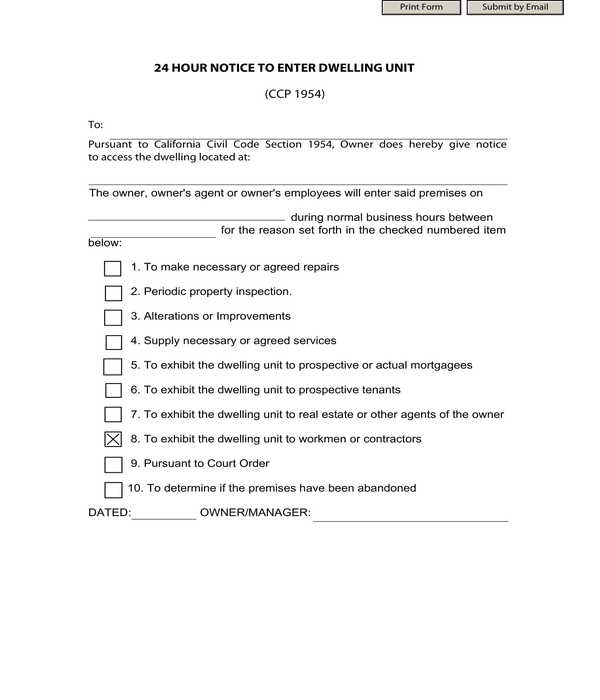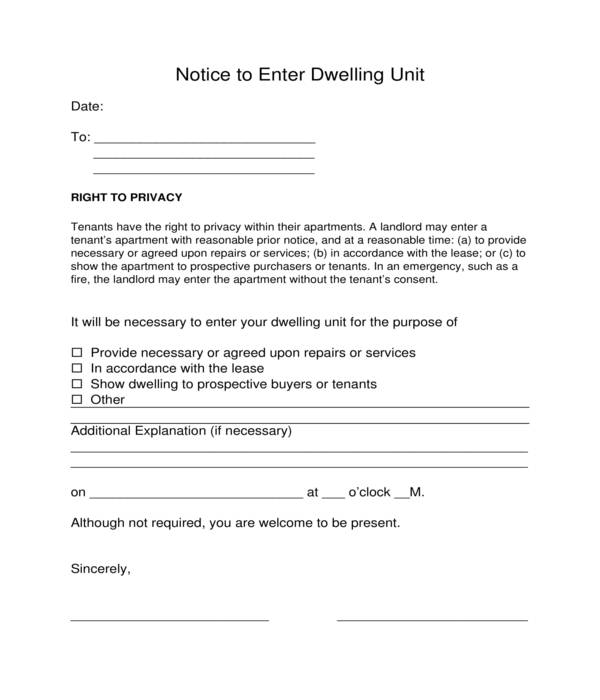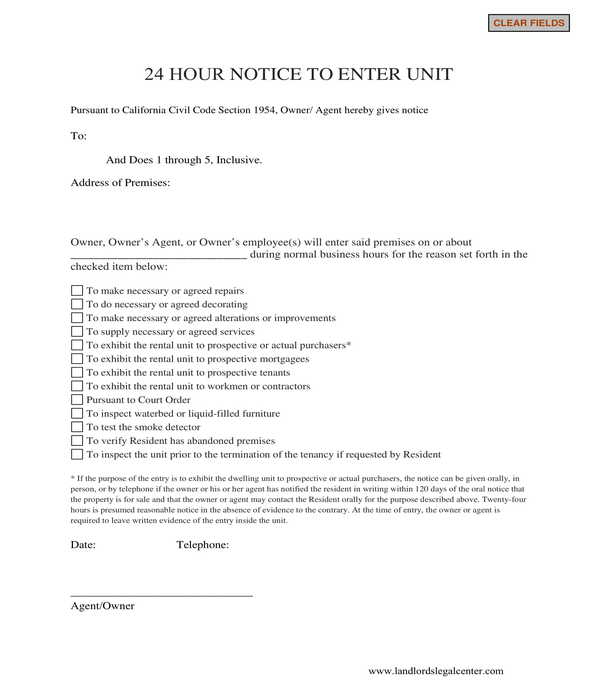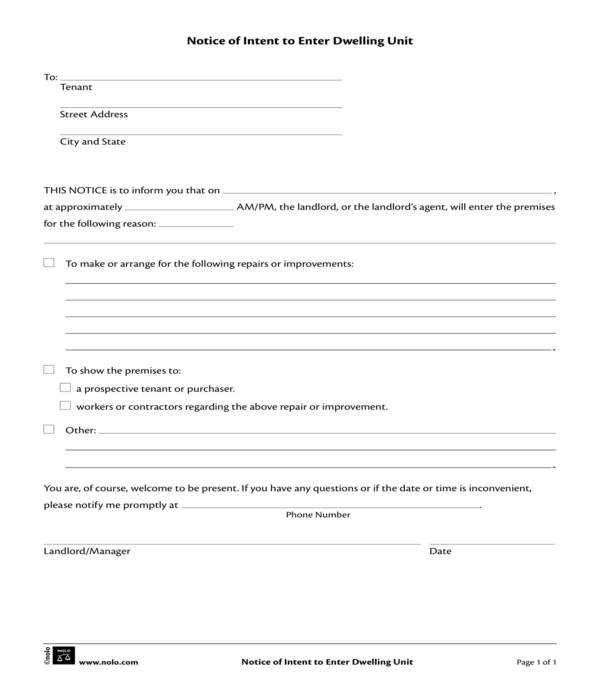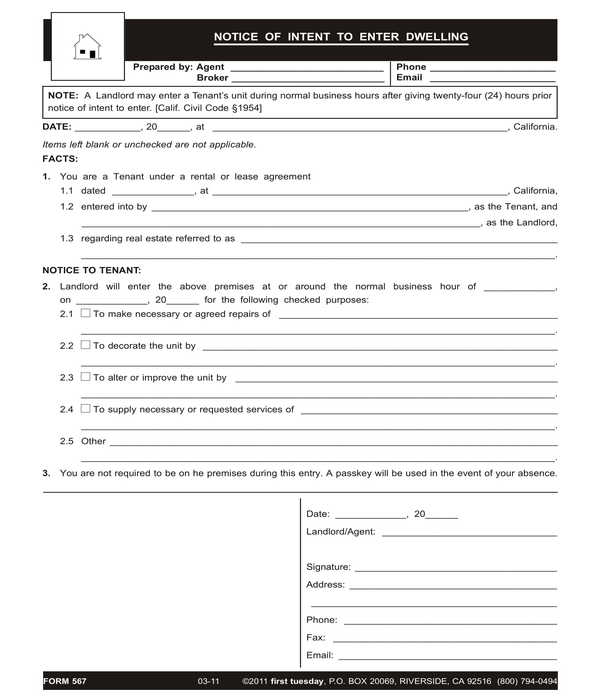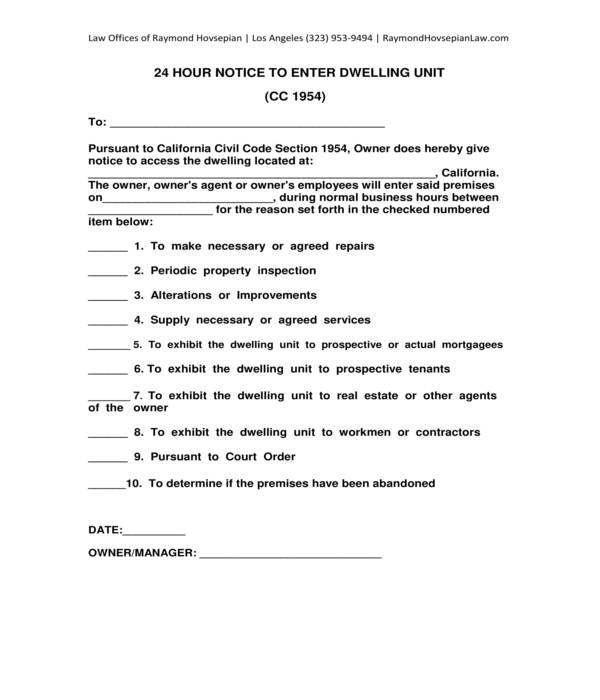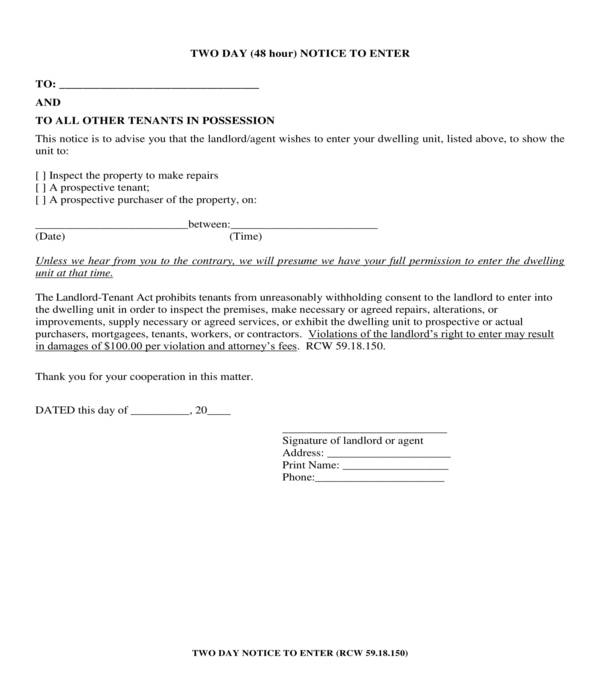Entering a property without permission to the residents or tenants living in the property can be a ground for lawsuits filed in court, even if the one who entered the property is the landlord or the owner. This is the reason why a notice to enter dwelling unit form should be created by anyone who plans to access a rented property. Although it is just a notice, it is deemed as a legal form in most States and countries, which makes it a requirement to be sent or be delivered by the landlord or the person who will be entering the property.
Notice to Enter Dwelling Unit Form Sample
Notice to Enter Dwelling Unit Form in DOC
What Is a Notice to Enter Dwelling Unit Form?
A notice to enter dwelling unit form is a document which should be used by landlords and any individual who wants to get inside the premises of a property which was leased to a resident or a tenant. The form will allow the tenant to be informed about the details of the activity such as the reason why and when the landlord will enter the dwelling unit.
Automated 24-Hour Notice to Enter Unit Form
Basic Notice of Intent to Enter Dwelling Unit Form
How to Create a Notice to Enter Dwelling Unit Form
Follow the steps below to begin creating a notice to enter dwelling unit form from scratch now;
Step 1: Choose the format to use for creating the form. There are different formats which can be used by landlords and property lease agents to make the notice form. The most basic is the “.DOC” format which can be made using word-processing programs and can be converted into “.PDF” or in portable document file format.
Step 2: Customize the sizes and style formats of the document sheet to be used. This includes the margins of each side of the document sheet as well as the sizes of the fonts, the spaces in each line, and the weight of each letter or word.
Step 3: Indicate a form title. The title should be in bold text or be emphasized, and it should be placed at the top portion of the form. However, if the one who will provide the notice is not the landlord, but an organization who is managing the lease, then the organization’s name, contact information, and logo should be placed before or above the title.
Step 4: Allocate an area for the date and the recipient’s information. This is where the tenant’s name will be stated along with the address of the dwelling unit, and the date when the notice form is being served to the tenant.
Step 5: Add a privacy rights statement. This statement must center on informing the tenant about his privacy rights in the property or in the unit that he is leasing in. Moreover, the objective of the notice can also be included in the statement.
Step 6: Make a list of reasons with checkboxes. Since there can be different purposes or reasons why the landlord will need to enter the tenant’s dwelling unit. These reasons should be enlisted along with a checkbox beside each reason to allow the landlord or the user of the form to mark his reason and state his explanation for further information to the tenant and the other residents of the property. In addition, an area for indicating the date and time when the landlord will be in the property must be incorporated below the explanations of the landlord’s reason.
Step 7: Include a signature block. The signatures of the parties who sent the notice should be collected in the form such as the landlord or the leasing agent.
Upon completion, the newly created form should be saved with a file name which can be identified immediately or is based on the title of the form. The file extension of the form should also be correct based on the preferred format in the first step mentioned above.
Broker Agency Notice to Enter Dwelling Unit Form
General Notice to Enter Dwelling Unit Premises Form
Benefits of Using Notice to Enter Dwelling Unit Forms in Different Formats
If the notice form will be delivered physically by the landlord, then a “.DOC” format can be used. A “.DOC” format is also known as a document file format which is often used along with Microsoft Word application software. The benefit of using this format is that it is easy to alter or update. However, in today’s generation where there are newer software versions, “.DOC” file formats can be interchanged with “.DOCX” format which is the output of the updated software programs.
The “.PDF” format, on the other hand, is suitable to be used for electronically sending notices to tenants such as through their emails. The reason for the electronic suitability of this format is because it retains its print-view regardless of the device to be used for reading or accessing the notice form. Furthermore, a “.PDF” format could not be altered easily as well compared to the “.DOC” format.
Two Day Notice to Enter Dwelling Unit Form
What Are The Types of Notice to Enter Dwelling Unit Forms?
There are two main types of notice to enter dwelling unit forms. Both types vary on the number of hours before the landlord or the sender of the notice will be visiting the dwelling unit of the tenant. The first type is known as the “24?Hour Notice to Enter Dwelling Unit Form”. Specifically, this document is to be used for landlords who will be informing the tenant for a minimum of twenty-four hours prior to the time of the entry. The most common reason wherein this notice form is used by a landlord is often to make small maintenance repairs and fixes in the property, or yet to simply inspect the property for safety and security.
The other form type is the “Two Day Notice to Enter Dwelling Unit Form” which is solely for giving a 48-hour notice period to the tenant. This allows the tenant to make preparations as compared to the aforementioned type. Landlords often use this form for two reasons: legal property inspections and to show the property to prospective tenants and buyers which is why the current tenant must have the unit cleaned, well-arranged, and must ensure that his belongings are kept especially if he will not be around during the activity.
Related Posts
-
60-Day Notice to Vacate Form
-
FREE 3+ Five-Day Notice Forms in PDF | MS Word
-
FREE 6+ Compliance Notice Forms in PDF | MS Word
-
FREE 5+ Notice to Enter Forms in PDF | MS Word
-
FREE 3+ Advance Beneficiary Notice Forms in PDF | MS Word
-
FREE 7+ 10-Day Notice Forms in PDF | MS Word
-
FREE 3+ Payroll Change Notice Forms in PDF
-
60 Day Notice Form
-
FREE 6+ Sample Notice of Election Forms in MS Word | PDF | Excel
-
FREE 5+ Sample Pull Notice Forms in MS Word | PDF
-
Notice of Exemption Form
-
FREE 7+ Sample Notice of Removal Forms in MS Word | PDF
-
FREE 5+ Parent Handbook Acknowledgement Forms in PDF | MS Word
-
FREE 5+ Notice to Owner Forms in PDF | Ms Word
-
FREE 6+ Sample Preliminary Notice Forms in MS Word | PDF

